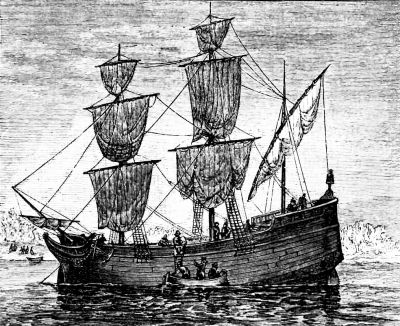On September 6th 1620, the English merchant ship ‘Mayflower’ sailed from Plymouth to its destination in North America, taking the first ‘pilgrims’ to the New World (see photograph). Four hundred years later in 2020, many people claim they are descendants of people who were on that ship. For those 132 passengers and crew it had been a miserable journey. They arrived on November 11th with a desperate first winter ahead, when more than half of them died.
With letters and records of such important events, their stories are easy to follow. My own children through their father can trace their family back to a Phillip Carrington, who died at sea aged about 50 in 1712 aboard the ‘Grenadier’.
When the Willis family of Fenny Compton left for America in the late 1600s, a servant from Napton went with them. Taking the surname Napton, his descendants in later years also named their town ‘Napton’ – a permanent reminder of where the family originated from.
Also associated with Napton but much later in 1849, John Checkley of Napton asked the Southam Union Workhouse Clerk for financial assistance for his emigration passage to Australia with his wife and six young children. Subsequently a cheque for £63 was passed to the Napton Emigration Fund and along with other costs paid by Napton Parish, the Checkley family passage came to just over £103 and they settled in Australia. For half that cost, the Parish could have sent them to Canada, but once a poor family was sent abroad they would no longer be a drain on the Parish accounts, hence their willingness to give assisted passage.
Such epic historical events feature in many a family history and if not in direct line, then we can often find other close relatives involved, such as in the case of a friend living at Ladbroke. Tracing her family back to the 1840s we discovered that several of her grt-grt-grandfather’s siblings sailed with the Mormons to New York and travelled west by wagon train to help build Salt Lake City! Her grt-grt grandfather stayed at home.
With another family I helped to confirm the family tale that his grandparents were married in Manhattan, New York in 1909. A common enough event, but one of fascinating interest to the family who are now wondering why they were in New York and why they didn’t stay there!
However, it is not always the big events in history that catch the family attention. Little events, perhaps only recorded in the local newspapers, maybe bring tears to our eyes or simply make us smile. Who would have thought that the cause of the Eathorpe Watermill catching fire in 1932 was because the miller’s wife, while on a pleasant evening boating on the calm mill pond with her husband, sneezed and lost her false teeth overboard? Several bathers were unable to find them, so Mr Woodward decided to drain the pond and in doing so, without the water-wheel to drive the electrical plant, a petrol engine was used which sadly set fire to the wooden surround it stood on. So for the sake of a set of false teeth, the watermill’s roof burnt down!
I often wonder what heartache, misery, sunshine or laughter is hidden within family history, and the Heritage Collection is always willing to help you discover your own family’s stories.


Leave A Comment